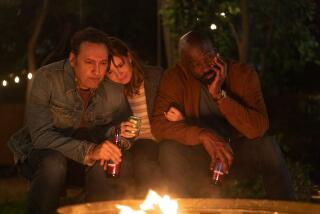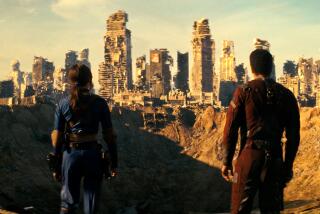‘Lost’ in endless mystery
- Share via
What’s down that hole?
On ABC’s “Lost” -- a fun series that at the close of its first season has become a tyrannical tease -- “What’s down that hole?” was preceded by “What’s in that hatch?”
Well, as we discovered Wednesday night, what’s in that hatch is the same as what’s down that hole -- another three episodes wrapped around a mystery that doesn’t reveal anything so much as another new mystery.
It was fitting that “Lost,” at the close of its two-hour finale, left viewers looking into a very long, dark space. Series co-creator Damon Lindelof, blurbing himself, was quoted as calling the ending “a cliffhanger that is emotionally satisfying but that demands that people talk about it all summer. It’s a ‘Who Shot J.R.?’ moment.”
Four characters poised over a hole as a summer talker? I mean, it’s a mysterious hole, well constructed and darkly suggestive, but here’s a safe bet: When “Lost” resumes after the long summer months, someone -- or some party of someones -- will go down that hole after an interval of deliberation about whose life journey has brought them to this moment. This will take an episode or two or three. Then, sometime during November sweeps, the person or persons who go down that hole will discover another strange creature/human being/vortex/the most amazing entry point to a shopping mall the modern world has ever known.
Perhaps, alternatively, whoever goes down the hole will never come back. I’m rooting for the shopping mall, because “Lost” needs to go David Lynch already; as things stand, the gimmicky horror movie gyrations and thriller buildups don’t produce either exhalations or, as in Lynch, newer, richer mysteries that deepen the storytelling and add to an overall mood or texture.
On “Lost,” the mysteries-upon-mysteries are more of a tic; a winning formula that is producing a certain viewer fatigue with every new turn. What’s in that tree? Who’s making that sound? Where are those voices coming from? The movie-quality execution of the show helps condition us to fall for each setup, even if the resolutions underwhelm while other, less dreamlike questions start to enter in too, including: Why hasn’t the large guy, Hurley, shown any weight loss after all these months? Who’s the stylist on the island who keeps Kate’s eyebrows in such fetching shape, and how have she and Jack been able to hold off from the romance that’s so clearly in the cards for them?
And now, this hole thing. Because it could be anything, really, that’s down there, the producers have left viewers stranded in a way that isn’t nearly as inclusive and potentially satisfying as the “Who Shot J.R.?” season-ending episode of “Dallas” in 1980 -- a cliffhanger that flattered and titillated the informed viewer and that became a sensation largely because the mystery had various attainable resolutions. All that summer, you could as reasonably have pinned the shooting on Cliff Barnes, J.R.’s arch-enemy/brother-in-law, and Sue Ellen, his alcoholic and psychically bruised wife, as on the actual trigger person, Kristin Shepard.
“Dallas,” when it resumed, was going to deliver a perpetrator, and we would know them; our involvement was due for a reward: “Lost,” when it starts again, is more likely to resume teasing us with new holes to replace the existing ones.
In the finale, the sorts of things that happen on “Lost” happened on “Lost”: A party of four -- the heroic doctor Jack, the beautiful criminal Kate, the intrepid jungle nomad Locke and the overweight slacker Hurley -- took sticks of dynamite to the mysterious hatch door found episodes ago in the jungle and blew it up, revealing the hole. Meanwhile, out at sea, another party of four -- the lovable scamp Sawyer, the stoic Jin, the father-and-son team of Michael and Walt -- got 15 miles offshore in the makeshift sailboat that took off in the penultimate episode of season one. As men tend to do when on a boat, there was a good bit of male bonding (a recurring theme on the night, if you include Sayid’s journey with Charlie and Jack’s interaction with Locke), followed by this: The guys on the boat encounter another boat, a sketchier boat (“Lost’s” version of the wrong side of the tracks), with sketchy men aboard, who abduct the young Walt.
On “Lost,” kidnapping is a favorite pastime, as is running through the jungle, panting, sweating, and the deep, meaningful exchange, seen in tight close-up. Kate (insisting on carrying the backpack of explosives): “I need to do this.” Jack: “Kate, no one here owes anyone anything.”
The finale teased the idea that the castaways are in some sort of metaphysical limbo state. “Do you think we’re being punished?” one asks, for “things we did before, secrets we kept, lies we told?”
Is it destiny that got them here? Fate? “Each one of us was brought here for a reason,” Locke tells Jack.
Maybe the reason’s in the hole. When “Lost” began, discovery was in the air, peril, possible death. The setup -- survivors of a plane crash find themselves stranded on a mysterious island that is or isn’t of this known world -- was pleasingly basic, as was the conceit to spend each episode looking into a character’s pre-crash life.
It sucked you into the show, knowing the colorful back stories that brought each of them to that plane flight.
But with its good ratings, it’s as if the show has become too protective of its own mystery, holding on to cards that were always somehow too valuable to play. Now it can all seem to me like an awful lot of schlepping to one side of the island and back again.
“Lost” began, rivetingly, with Jack (Matthew Fox), staring up at the sky, post-plane crash. The first season ended with him looking down a hole. Whatever is down that hole, it needs to make us feel that we’re finally getting somewhere.
More to Read
The complete guide to home viewing
Get Screen Gab for everything about the TV shows and streaming movies everyone’s talking about.
You may occasionally receive promotional content from the Los Angeles Times.






